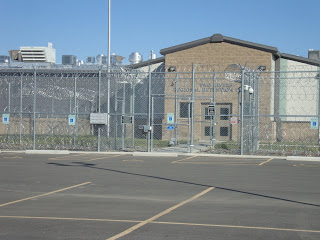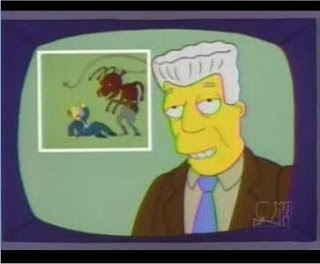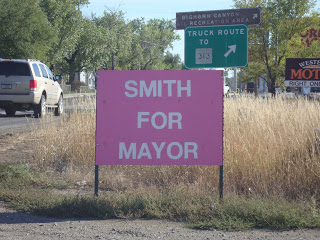Sunday, October 4, 2009
The Hardin Saga: Waiting for the Punchline

(All Hardin photos by Scott Watson, except where noted.)
A lovely town, a nasty predicament: Thanks to the less-than-visionary “leadership” of its municipal government, the friendly residents of the beautiful town of Hardin, Montana are burdened with $27 million in debt for a huge, empty prison and a business deal with a shadowy mercenary group fronted by a convicted felon.
Hardin, Montana — In his memoir Against All Hope, former Cuban political prisoner Armando Valladares tells the story of a Cuban ruler who built a huge prison, a structure several times larger than necessary to incarcerate the island’s criminal population.
When he was chastised by an adviser for spending a considerable sum on a prison too big to use, the dictator smiled and replied: Don’t worry, someday a ruler will come along who will fill it up.
The “someone” predicted by that ruler was Fidel Castro.
Just inside the city limits of Hardin, Montana (pop. 3,500), next to an IGA grocery store and not far from a sugar plant, there sits a huge, empty “jail” — actually, a small prison — that cost $27 million to construct. Driven to desperation as its construction bonds went into default, the city government, acting through its economic development arm, the Two Rivers Authority (TRA), offered last March to accept prisoners from the Gitmo detention camp.
Who’s going to fill it up? The empty Two Rivers Detention Facility in Hardin, which became a minor tourist attraction last week.
That offer piqued the interest of some yet-unnamed people in California, who chartered a security pseudo-firm calling itself the American Police Force (APF).
The figurehead of that ersatz mercenary outfit is a diminutive Montenegrin Serb known by several aliases, most recently “Captain” Michael Hilton.
Although he originally claimed to have extensive military experience in Iraq and Afghanistan, “Captain” Hilton — a convicted felon and veteran scam artist — eventually admitted that he had no military experience; this means he’s a “captain” in roughly the same sense that Captain Crunch is worthy of the honorific.
Last summer Hardin’s TRA reportedly entered into an agreement with APF to operate the jail for a fee of $2.6 million annually. TRA also promised to spend even larger sums to expand the detention center; they also announced plans to build an international training center for law enforcement and military personnel, as well as to construct housing for the personnel who would soon supposedly besiege the economically depressed town. The company also promised to provide a bounty of other civic assets, including a homeless shelter — despite the fact that Hardin is a small town with no homeless population.
While discussions over management of the jail (more aptly called a prison) were going on, a second and possibly related process was nearing its conclusion.
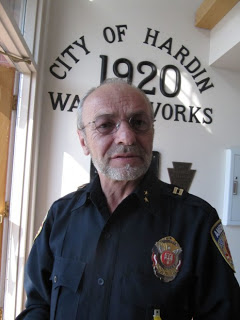
(Billings Gazette photo)
Since 1976, Hardin has had a contract with the Big Horn County Sheriff’s Office (which is headquartered in the town) to provide law enforcement coverage.
In recent years, the sheriff’s office has complained that the city government wasn’t providing sufficient resources to provide services for Hardin while simultaneously covering a very large territory.
Accordingly, the city and sheriff’s office have been negotiating a “deconsolidation” agreement, under which the contract with the sheriff’s office would be terminated, and Hardin would provide its own police force.
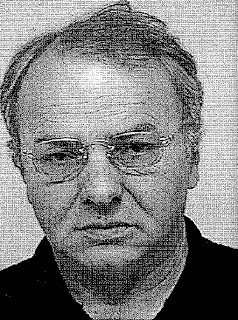
(Via the Billings Gazette.)
Just as the “deconsolidation” negotiations were nearly finished, “Captain” Hilton and another APF personality styling himself “Sergeant” Martin came rolling into town in two black Mercedes SUVs sporting magnetic decals advertising themselves as the “City of Hardin Police Department.”
This naturally led to speculation, both locally and — via the internet — nationally and beyond, that the APF, a mercenary outfit led by an odd little man with a thick Slavic accent, was taking over law enforcement in Hardin.
In an interview with Pro Libertate, Big Horn County Undersheriff Rondell Davis — a candid and thoroughly professional young man who arrived in Hardin about a year and a half ago — pointed out that the APF had violated both the Montana State Code and state constitution by depicting themselves as Hardin’s new police force.
Davis described the convergence of APF’s arrival and the soon-to-be-completed deconsolidation talks as a “coincidence.” “If Hardin wants to set up its own police force, and can find the resources to fund it,” he said, “that’s fine.” The APF, however, obviously wasn’t suitable for the job.
“If this outfit had been legitimate, the first thing they did when they came to town would have been to have a town meeting to introduce themselves, explain who they were and what they were going to do, and take questions,” Davis observed. Instead, the group — which, as far as anybody knows, includes only “Captain” Hilton and “Sergeant” Martin — emitted a dense fog of extravagant promises while being cryptic and disingenuous in dealing with questions about its parent company, activities, personnel, assets, and qualifications, if any.
Interestingly, Undersheriff Davis described Hardin as a town with little-to-no violent crime. The most persistent problem, he pointed out, was dealing with people who have a bit too much to drink — an assessment validated by a quick glance at the arrest reports published in the town’s weekly newspaper, the Big Horn County News.
A welcome Throwback: He’s a young man, but Big Horn County Undersheriff Rondell Davis is a candid, personable, low-key peace officer of the Old School. On the desk in front of him, incidentally, could be found materials provided to him by the Oath Keepers.
When he spoke with Pro Libertate, Davis was preparing for a Friday night during which he would provide backup for the single deputy assigned to patrol the entire county.
During a long walk late that evening in which I explored the length and breadth of the town, I saw nothing to indicate that there was a crime problem of any kind in Hardin.
The only sign of potential trouble I encountered was a small knot of visibly drunken young people — several Indian youth from the local Crow Reservation in the company of a few local non-Indians — outside a local convenience store. The “ringleader” of the group, a tall kid who appeared to be about 22 years old, reacted to the arrival of a stranger by offering me a friendly fist-bump.
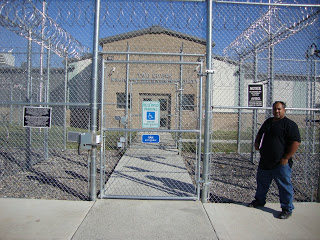
During that nocturnal excursion, as well as a second one undertaken the following morning, I also failed to find any evidence that Hardin was being turned into a garrison state.
Contrary to reports given wide cyber-circulation, there was no portcullis being constructed at either end of the town.
Armed commandos said to be patrolling the streets failed to materialize. Nor was there any indication that people were being disarmed by foreign troops, or rounded up for incarceration and compelled injections of the legitimately dreadful H1N1 vaccine. As was the case with many others, the situation in Hardin came to my attention by way of an anonymous e-mail account that portrayed the town as an open-air prison quite similar to the totalitarian community described in Out of the Gray Zone, the terrific recent novel written by the estimable team of Claire Wolfe and Aaron Zelman.
My reaction, which I shared with those who listen to my weekday radio broadcast, was to suggest that there might be a nucleus of disturbing truth inside the accretions of alarmist speculation and apocalyptic embellishment. That much is certainly true, as I’ll discuss anon.
I want to emphasize that some of the speculation was, up to a point, entirely justified, given the grandiose claims made by the APF and the clinically demented credulity of the Hardin municipal government:
Where did people get the idea that the group calling itself the “American Police Force” was going to be patrolling the mean street(s) of Hardin?
This idea came directly from the mouth of “Captain” Hilton himself.
As quoted in the September 17 Big Horn County News, Hilton (we’ll use that surname for the sake of convenience) boasted of his group’s purported manpower, assets, and experience in providing security for cruise ships, airliners, and convoys in Iraq and Afghanistan.
Hilton then asserted that the group could draw on the services of “contractors” from around the world to provide Hardin with a security force. “Hardin will be the safest place in the United States to live, and in six months the best place to live,” Hilton insisted.
If I may be forgiven for employing the cliche, Hilton was carrying coals to Newcastle: Hardin already is an exceptionally safe place to live, in large measure because that town, like most others in Montana, is populated by people who own and know how to use firearms.
Of particular interest in this connection is the fact that Hilton’s proposal to use APF as a city police force was repeated at face value, and with considerable enthusiasm, by Jim Eshleman, a reporter and photographer for the Big Horn County News, in a September 24 column assailing APF’s local critics and defending the organization’s compulsive secrecy.
“Having spoken with a representative from the American Police Force I was told on a number of occasions that Hardin will be the safest town in the United States and in six months will be the best place to live in the United States,” regurgitated Eshleman.
Besides, who could complain about turning over control of the town to a secretive, unaccountable paramilitary group as long as their checks clear?
“As far as I’m concerned, if a little secrecy means good, high-paying jobs and an economic boost to the city, then I say go for it,” insisted Eshleman. “There is no reason to do anything that might put the project into jeopardy…. [I]n spite of the secrecy, it’s in the best interests of the community that we partner with the American Police Force and work together for the economic good of not only Hardin, but of Big Horn County and the Crow Reservation.”
Charming.
If Hardin were faced with the prospect of conquest by a sentient race of alien space ants, Eshleman would likely publish a column welcoming the town’s new insect overlords and reminding them that, as a trusted local media personality, he could be helpful in rounding up others to toil in their underground sugar caves.
Given that Hilton’s claim was given wide circulation, and prominently endorsed by a local representative of the “respectable” media, it isn’t surprising that rumors began to proliferate that Hardin was either preparing to give APF the run of the town, or that APF had already dispatched battle-hardened paramilitary operators to police the streets.
How did the notion arise that the APF had brought foreign troops to Hardin?
Again, the fons et origo of this rumor was none other than the illustrious “Captain” Hilton.
“APF is going to be bringing in high-level military and police to train,” claimed Hilton, as reported in the September 24 Big Horn County News. “Twenty-five percent from America and seventy-five percent international top military leaders from around the world.”
Also noteworthy was Hilton’s bogus boast that APF had been “running international detention facilities since it was incorporated in 1984.” This statement, though entirely false, probably contributed to speculation about foreign prison guards being imported to staff the Two Rivers Detention Facility. And that speculation was fortified by Hilton’s claim that the cost of maintaining the military/police training facility would be paid either by “the international community … or the U.S. government.”
How on earth did people come to the conclusion that Hardin residents would be rounded up and compelled to undergo flu vaccinations?
An October 1 Associated Press report quoted Hilton as promising to “dispatch security to patrol Hardin’s streets” and also that he had offered “free health care to city residents out of the jail’s clinic.” This seems to be the acorn that grew into a mighty oak of misinformation regarding round-ups of recalcitrant residents for compelled injections.
It’s worth remembering that all of these claims were made at a time when the Hardin city government was talking about creating its own police force — and the APF rolled into town advertising itself as the “City of Hardin Police Department.” Add a large dose of impenetrable secrecy, stir lightly, and the result is a casserole of rumors and innuendo lightly seasoned with fact.
The Hardin city government fled the scene once media attention was focused on its deal with the Goniff Michael Hilton. When Pro Libertate visited Hardin municipal offices on October 2, we were told by a very nice woman working as a cashier at the utilities office that the City Council were in “meetings.” If those meetings took place, they occurred somewhere other than City Hall, which was locked down tight at 3:28 PM on a Friday afternoon.
Mayor Ron Adams was nowhere to be found. Greg Smith, executive director of the TRA, and his wife, mayoral candidate Kerri Smith, had likewise disappeared.
“Captain” Hilton headed back to California on October 1, promising to return a few days later to preside over a “job fair.”
Becky Shay, the former Billings Gazette reporter hired as a spokesperson for APF, likewise left town. The only people connected in any way to the APF or the prison with whom I was able to speak were two people hired to clean the facility. When I spoke with them just outside the prison’s front gate they seemed eager to be finished with the job and anxious regarding the question of whether their check would clear.
During a press conference in Billings, after deflecting several questions and making the robustly implausible claim that APF “welcomed” a fraud investigation by the Montana Attorney General, Shay broke down in tears claiming that she feared that her life was imperiled — not by the felon running the fraudulent company she was hired to front, but by that company’s critics.
On Saturday morning (October 3), the Gazette reported that Allied Defense Systems, an authentic military contractor that had supposedly agreed to provide uniforms for APF prison guards, announced that it had sent a letter to Hilton threatening a lawsuit over the use of the company’s name.
Maziar Mafi, the Santa Ana attorney who acted as “legal affairs director” for APF, was suspending his involvement with the group. This he did despite the fact that Michael Hilton generously conferred on Mafi the rank of “captain” in the APF, which appears to consist entirely of two “captains” and a “sergeant.”
Mafi’s sudden disenchantment with the group may have something to do with the fact that APF had missed the first payment on the black SUVs it had used to make its grand entrance into Hardin. Mafi was the one who had co-signed the loan to buy the vehicles. Becky Shay, who has already suffered a great deal in exchange for a promised $60,000 annual salary, an APF-provided black Mercedes SUV, and a new, APF-provided home, most likely will receive a visit from a repo man in the near future.
With Hilton’s scam falling apart as quickly as a Ritz cracker in hydrogen peroxide, it’s likely that Hardin’s taxpayers will end up being fed some substantial portion of the $27 million in rotten bonds issued to pay for the construction of the Two Rivers prison. But somebody will end up owning that huge, empty prison.
This brings me to a couple of important questions that have yet to be answered. First, who provided the money behind Hilton’s little con game? Second, what was Hilton or his sponsor going to get out of conning the Hardin city government?
The point of a con, of course, is to get something, rather than to give something. Hilton promised a great deal, but unless he received as-yet undisclosed cash payments or other blandishments from the TRA, it’s difficult to see how he would profit from his deception. This wouldn’t be the case, however, if he was working on behalf of somebody with an interest other than financial enrichment.
There remains a possibility that somebody acting with malign intentions wanted to acquire that prison — and it’s also possible that the same individual or group could run a more competent version of this scam in some other economically depressed town that turns to incarceration as a new source of revenue.
“We’re just a big joke,” complained a sad-eyed but sweet middle-aged waitress the morning of our departure from Hardin. No, it’s your municipal government that’s made itself look ludicrous, I insisted.
The chief unanswered question is this: If the APF affair is a joke, then what’s the punchline? Who is going to fill up Hardin’s empty prison?
For additional coverage of the Hardin controversy, go here for my first radio program on the subject, and here for my live report from Hardin. And watch for a video report that will be available soon.
___
(My sincere thanks to my good friend Scott Watson for his invaluable help on this story.)
Be sure to tune in weekdays from 6:00-7:00 Mountain Time for Pro Libertate Radio on the Liberty News Radio Network.
Dum spiro, pugno!
Content retrieved from: http://freedominourtime.blogspot.com/2009/10/hardin-saga-waiting-for-punchline.html.


